Speaker Bios
The CCDI Symposium is cancelled.
The CCDI Symposium is cancelled.
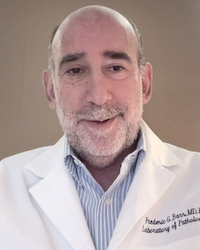
National Cancer Institute
Deputy Chief, Medical Director, and Senior Investigator, Laboratory of Pathology
Dr. Frederic G. Barr attended Washington University School of Medicine where he obtained his M.D. and Ph.D. degrees. Subsequently, he received residency training in anatomic pathology at the Hospital of the University of Pennsylvania and performed postdoctoral research in the Division of Human Genetics and Molecular Biology at the Children's Hospital of Philadelphia. He spent 19 years on the faculty of the Department of Pathology and Laboratory Medicine at the University of Pennsylvania School of Medicine and then joined the National Cancer Institute in 2011 as a Senior Investigator and Deputy Chief of the Laboratory of Pathology. In 2016, he was also appointed Medical Director for the Laboratory of Pathology. His research program uses a multidisciplinary approach involving genomics and bioinformatics along with cell culture and animal models to study recurrent genetic and epigenetic alterations in cancer. In particular, his laboratory focuses on the rhabdomyosarcoma family of soft tissue sarcomas to investigate the molecular basis, biological consequences, and therapeutic implications of genetic and epigenetics alterations in these cancers. Dr. Barr has been a member of Soft Tissue Sarcoma Steering Committee of the Children’s Oncology Group since the group’s inception in 2000, and he recently completed an 8-year appointment as Senior Associated Editor for the Journal of Molecular Diagnostics.
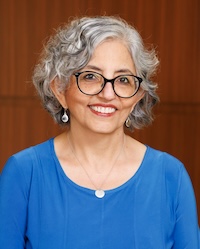
University of Alabama at Birmingham
Director of the Institute for Cancer Outcomes and Survivorship
Dr. Smita Bhatia completed her MBBS and M.D. (Pediatrics) from the All India Institute of Medical Sciences, New Delhi. She then received training in Hematology/Oncology/Bone Marrow Transplant and Blood Banking and Epidemiology from the University of Minnesota. She served as founding chair of the Department of Population Sciences at City of Hope from 2006 to 2014. Dr. Bhatia joined University of Alabama at Birmingham (UAB) in 2015 to establish the Institute for Cancer Outcomes and Survivorship. She is the White Endowed Distinguished Professor in Pediatric Oncology at UAB. With over 500 peer-reviewed publications and continuous funding from the National Cancer Institute (NCI) and the Leukemia & Lymphoma Society (LLS) since 2000, she is an internationally renowned leader in cancer outcomes and survivorship. She serves as Associate Editor for the Journal of Clinical Oncology and Senior Editor for Cancer Epidemiology Biomarkers and Prevention. She is an elected member of American Society for Clinical Investigation and Association of American Physicians. She is the recipient of the Frank H Oski Lectureship Award from ASPHO, the Clinical Scholar Award from the LLS, the Outstanding Investigator Award from NCI, and the Cancer Prevention Award from American Society of Clinical Oncology (ASCO)/American Cancer Society (ACS). She was the recipient of the Dean’s Excellence Award in Mentoring in 2020 and the Distinguished Professor Award from UAB in 2021. Her service has included membership on the Executive Committee for the Children’s Oncology Group and the Childhood Cancer Survivor Study, and the Board of Directors of ASCO and the St. Baldrick’s Foundation. She was appointed as member of the NCI National Cancer Policy Forum and NCI Clinical Trials Advisory Committee.

Harvard Medical School
Associate Professor of Pathology
Dr. Alanna Church is an Associate Professor of Pathology at Harvard Medical School and a molecular pathologist at Boston Children’s Dana Farber Cancer Center. She is board-certified in anatomic, pediatric, and molecular genetic pathology and serves as Associate Director of the Laboratory for Molecular Pediatric Pathology (LaMPP), which she co-founded. Dr. Church is nationally recognized for her leadership in developing molecular diagnostics to guide precision oncology for children, and she co-chairs multiple national and international initiatives on pediatric cancer genomics. She is the program director for the Harvard Molecular Genetic Pathology Fellowship, the Chair of the Clinical Practice Committee, and a member of the Board of the Association for Molecular Pathology. Her research and clinical efforts focus on integrating tumor and germline sequencing to improve diagnosis, treatment, and equity in pediatric cancer care.
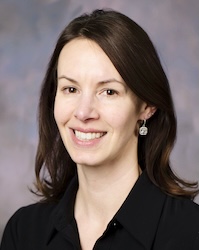
Nationwide Children’s Hospital
Section Chief of the Institute for Genomic Medicine Clinical Laboratory
Dr. Catherine Cottrell serves as Section Chief of the Institute for Genomic Medicine (IGM) Clinical Laboratory at Nationwide Children's Hospital. She is a Professor-Clinical in the Departments of Pathology and Pediatrics at the Ohio State University College of Medicine. Dr. Cottrell is dual certified by the American Board of Medical Genetics and Genomics in the specialties of cytogenetics and molecular genetics, having completed her fellowship training at the Ohio State University and Nationwide Children’s Hospital in Columbus, OH. Following the conclusion of her fellowship, Dr. Cottrell assumed a faculty position in at Washington University School of Medicine in Saint Louis, MO. In the six years she spent at Washington University, she ultimately served as the Director of the Cytogenetics and Molecular Pathology Laboratory and as an associate professor in the Department of Pathology and Immunology and Department of Genetics. She returned to Nationwide Children’s Hospital in 2016. Dr. Cottrell specializes in the clinical interpretation of high-complexity genomic laboratory tests including exome and genome sequencing, gene fusion analysis, molecular testing, chromosome analysis, and methylation microarrays. She is highly engaged in the development of new clinical diagnostic assays. She is the principal investigator of a translational research protocol within IGM aimed at genomic profiling in patients with rare and refractory cancer, hematologic, or somatic disease. She is a co-investigator of the Clinical Trial Specimen Molecular Characterization Program supporting the CCDI Molecular Characterization Initiative, a project with global reach aimed at understanding the genetic components of pediatric cancers. She is the Program Director of the ACGME-accredited Laboratory Genetics and Genomics fellowship at Nationwide Children’s Hospital. Her current clinical and research emphasis includes the genomic study of tumors and vascular anomalies, and the development of best practices in variant interpretation.
Circle Pharma
Senior Vice President, Head of Early Development
Dr. Michael Cox currently serves as Senior Vice President, Head of Early Development at Circle Pharma. Over his career, he has led the clinical development, product launches, and life cycle management of numerous oncology products for pediatric and adult patients including tovorafenib (ojemdaTM), selpercatinib (Retvmo®), larotrectinib (VITRAKVI®), radium-223 (Xofigo®), regorafenib (Stivarga®), sorafenib (Nexavar®), cetuximab (ERBITUX®), denosumab (XGEVA®), and darbepoetin alfa (Aranesp®).
Prior to joining Circle, Dr. Cox served as Vice President, Clinical Development at Day One Biopharmaceuticals where he led the pediatric clinical development program for tovorafenib. Prior to Day One, he held global and regional clinical development and medical affairs positions of increasing responsibility at Loxo Oncology (aquired by Eli. Lilly & Co), South San Francsico, California; Bayer Consumer Care AG, Basel, Switzerland; Merck KGaA, Darmstadt, Germany; and Amgen, Inc., Thousand Oaks, California.
Dr. Cox has published abstracts and manuscripts in journals including The New England Journal of Medicine, Lancet Oncology, the Journal of Clinical Oncology, Cancer, and Clinical Cancer Research. He is a member of numerous cancer research organizations including the American Association of Cancer Research, the American Society of Clinical Oncology, and the European Society of Medical Oncology.
Dr. Cox received his Pharm.D. from Ohio Northern University and an M.H.Sc. in Clinical Research from Duke University’s School of Medicine. Dr. Cox completed pharmacy practice residencies at Mission Hospitals in Asheville, North Carolina and the University of Pittsburgh Cancer Institute – University of Pittsburgh Medical Cancer in Pittsburgh, Pennsylvania. He completed a medical oncology/clinical drug development fellowship in the Clinical Pharmacology Section, Center for Cancer Research at the National Cancer Institute in Bethesda, Maryland. Dr. Cox is a Board-Certified Oncology Pharmacist.
National Cancer Institute
NCCR Technical Lead and Health Data Scientist
Johanna Goderre is a seasoned IT and health data security expert with over 20 years of experience leading large-scale technology, surveillance, and security initiatives across government and public health sectors. She specializes in designing and managing enterprise data systems, overseeing cybersecurity compliance, and leading high-stakes informatics projects that enhance national health security. Johanna has led the development of the National Cancer Institute’s National Childhood Cancer Registry cloud-native data platforms that securely integrates registry and real-world data sources, ensuring robust interoperability and compliance with federal security mandates.
Previously, Johanna directed analysis and business strategy for major federal health IT programs, where she managed multi-million-dollar contracts and advised on policy, data privacy, and risk management. Her background in project management, IT architecture, and federal compliance has been instrumental in advancing secure data-sharing frameworks and surveillance technologies. She holds a Master of Public Health with a focus on informatics and GIS applications and is adept at driving Agile methodologies in complex environments.
Committed to leveraging technology for national security and public health resilience, Johanna continues to influence federal data strategy through her expertise in analytics, cloud security, and surveillance informatics.

National Cancer Institute
Deputy Director for Data Science and Strategy
Dr. Warren Kibbe is the inaugural National Cancer Institute (NCI) deputy director for data science and strategy, working across NCI, the National Institutes of Health, and with other agencies, academia, and industry to define the data science strategy for cancer research. Previously, he was the Vice Chair and Professor of Biostatistics and Bioinformatics in the School of Medicine at Duke University. His research interests include data representation for clinical trials, especially improving the computability and interpretability of biomarker and eligibility criteria and data interoperability between medical records and decision support algorithms. He has been a proponent for open science and open data in biomedical research and helped define the data sharing policy for the NCI Cancer Moonshot program.
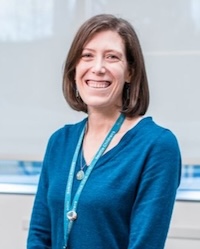
Seattle Children's Hospital
Pediatric Oncologist
Dr. Sarah Leary is the Medical Director of the Pediatric Brain Tumor Program and the Medical Director of Clinical Cancer Research at Seattle Children’s Hospital. She is a Professor of Pediatrics at the University of Washington School of Medicine and affiliate of the Fred Hutch Cancer Center. Nationally, she serves as the Clinical Vice-Chair of the Central Nervous System Committee of the Children’s Oncology Group and Chair of the Clinical Data Operations Core of the Children’s Brain Tumor Network. Her clinical and research focus is in the area of precision medicine and therapy development to improve survival for children with brain tumors.
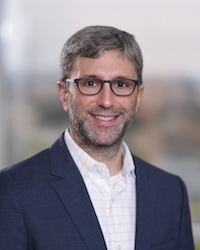
Emory University School of Medicine
Professor of Pediatrics
Dr. Philip Lupo is a genetic epidemiologist, a Professor of Pediatrics at Emory University, and Co-Director of the REACH Center in the Pediatric Research Alliance. Dr. Lupo’s research focuses on cancer predisposition in children and outcomes in these individuals. This work is facilitated through his work in the Children’s Oncology Group, where he is the Chair of the Epidemiology Committee. Examples of his currently funded research include the Genetic Overlap Between Anomalies and Cancer in Kids (GOBACK) Study, an international collaboration to identify novel cancer predisposition syndromes in children with structural birth defects; the Reducing Ethnic Disparities in Acute Leukemia (REDIAL) Study; and the Genetic Information for Families after Tumor Testing (GIFTT) Study, which seeks to evaluate outcomes in children with cancer predisposition syndromes and increase uptake of genetic services in their family members. The goal of Dr. Lupo’s research is to discover factors that can be used in new prevention efforts and targeted interventions to limit the adverse consequences of pediatric cancer.
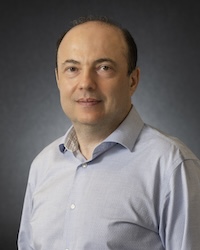
Texas Children’s Cancer Center
Director of the Center for Advanced Innate Cell Therapy
Dr. Leonid Metelitsa is a Professor of Pediatrics at Baylor College of Medicine and the Director of the Center for Advanced Innate Cell Therapy at Texas Children’s Cancer Center and Texas Children’s Hospital in Houston. His research focuses on the role of natural killer T (NKT) cells in tumor immunity and the development of NKT cell-based cancer immunotherapies. For the past 20 years, Dr. Metelitsa has been continuously funded as a principal investigator on National Institutes of Health/National Cancer Institute R01 grants. His laboratory was the first to demonstrate the presence of NKT cells in human primary tumors and their association with favorable clinical outcomes. He pioneered methods for isolating NKT cells, engineering them with chimeric antigen receptors (CAR), and expanding them at clinical scale. Recently published results from the first-in-human clinical trial of CAR-NKT cells show objective responses in children with relapsed or refractory neuroblastoma.

Ohio Department of Health
Regional Health Officer
Ann Ramer is currently a Regional Health Officer for Northeast Ohio and organizes pediatric cancer work for the Ohio Department of Health. Ann has extensive experience in health advocacy that is specific to pediatric and adolescent cancer at the local, state, and national level. She served on the family advisory council at her local hospital, offered testimony to the Ohio's state legislature's health and human services subcommittee, and has joined other advocates to lobby members of Congress for passage and funding of the STAR Act and other legislation that benefits children with cancer. Additionally, she has advocated for policy changes at the Food and Drug Administration to expand the eligibility of adult clinical trials to include adolescents down to age 12. Ann began working with Ohio Partnership for Cancer Control (OPCC) in 2019 as a member of the workgroup that developed the pediatric section of Ohio's 2030 state cancer plan, the first time that the needs of children were represented. She now organizes and leads the implementation of those strategies. Ann serves on the OPCC executive committee and serves on the palliative care and survivorship workgroups. She recently helped to modify eligibility criteria for an Ohio program which now provides financial support for the recommended screening protocols for all children found to have cancer predisposition. Her wide-ranging interest in research and health policy originated from the experience of repeated cancer diagnoses in two of her four children, Brent and Lauren. Because of a rare cancer predisposition syndrome, each child developed multiple malignancies, often simultaneously. This experience, as well as the loss of her son in 2017, is what informs and motivates her work in health policy and a systems approach to change.

National Cancer Institute
Childhood Cancer Data Initiative Scientific Director
Dr. Gregory Reaman is the Scientific Director of the National Cancer Institute (NCI)’s Childhood Cancer Data Initiative (CCDI) and Professor Emeritus of Pediatrics at George Washington University School of Medicine and Health Sciences in Washington, D.C. and Executive Director Emeritus of the Center for Cancer and Blood Disorders at the Children’s National Medical Center, which he directed for more than 17 years. He was the Inaugural Chair of the Children’s Oncology Group, serving in this capacity from 2000 through 2010. Prior to this, he was the Vice Chair for Scientific Affairs and the Associate Chair for New Agent Studies of the Children’s Cancer Group (CCG) for ten years and directed the CCG Phase I Consortium. He joined the Food and Drug Administration (FDA) in 2011 as the Associate Director for Oncology Sciences in the Office of Hematology and Oncology Products in the Center for Drug Evaluation and Research and in 2016, served as the Associate Director for Pediatric Oncology in the FDA’s Oncology Center of Excellence until 2022, when he joined NCI. Dr. Reaman has served on multiple editorial boards; he was an Associate Editor of Cancer and Leukemia and Lymphoma. He served on the Board of Directors of the American Cancer Society and chaired its task force on Children and Cancer and has served on the Board of Directors of the American Society of Clinical Oncology (ASCO) as well as the International Society of Pediatric Oncology (SIOP); he has served on numerous ASCO committees and ad hoc NCI review panels, and the steering committee of the AACR’s Pediatric Cancer Working Group. His research interests are the biology and treatment of childhood acute leukemia and new drug development for pediatric cancers. He has authored over 395 peer-reviewed manuscripts, 25 book chapters, and served as editor of 9 textbooks.
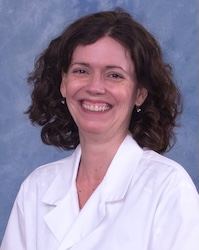
Indiana University
Director of Pediatric Pathology and Professor of Laboratory Medicine and Pathology in the Department of Pathology
Dr. Erin Rudzinski completed her undergraduate degree at Berry College in Rome, GA and medical school at the Medical College of Georgia in Augusta, GA. She completed residency in anatomic and clinical pathology, followed by a fifth-year anatomic pathology fellowship at Vanderbilt University Medical Center in Nashville, TN. Dr. Rudzinski then moved to the Pacific Northwest, where she completed her pediatric pathology subspecialty training at Seattle Children’s Hospital/University of Washington Medical Center. Dr. Rudzinski practices general pediatric pathology with an emphasis on pediatric solid tumors, and she is an expert consultant for pediatric soft tissue tumors, particularly rhabdomyosarcoma. She is an active member in the Children’s Oncology Group (COG), where she is Chair-elect for the Pathology Discipline Committee. She is the Pathology Lead for the CCDI Molecular Characterization Initiative, lead pathologist for the Soft Tissue Sarcoma Committee, and the primary central review pathologist for rhabdomyosarcoma clinical trials. She also represents COG as part of a new international soft tissue sarcoma consortium (INSTRuCT). Dr. Rudzinski is an author of 100+ manuscripts on pediatric pathology and multiple book chapters on rhabdomyosarcoma and pediatric solid tumors, with over 8,000 citations. She serves on the Editorial Board for Pediatric and Developmental Pathology, and she has spoken nationally and internationally on pediatric soft tissue pathology.
St. Jude Children’s Research Hospital
Director of Bioinformatics Software Development
Michael Rusch joined St. Jude Children’s Research Hospital in 2010 as a software engineer working on the Pediatric Cancer Genome Project. Since 2015, he has led the Software Engineering Group in the Department of Computational Biology. His group provides automated computational analysis for genomics research projects, performs bioinformatics pipeline development and validation for clinical genomics assays, and builds and manages St. Jude Cloud, an ecosystem of premiere data sharing tools.
National Cancer Institute
Head of the Tumor Evolution and Genomics Section in the Pediatric Oncology Branch
Dr. Jack Shern is a physician scientist within the Pediatric Oncology Branch. His research is focused on defining and developing precision therapies targeting the genetic mutations that drive tumorigenesis. Most recently, his efforts have turned towards using single cell sequencing to discover tumor subclonal populations that are responsible for relapse and refractory disease. He is actively engaged in the Children's Oncology Group, working on pediatric soft tissue sarcomas to investigate the utility of using mutational information as biomarkers for the diagnosis and management of pediatric rhabdomyosarcoma.

National Cancer Institute
Associate Branch Chief for Pediatric Oncology, Cancer Therapy Evaluation Program
Dr. Malcolm Smith is Associate Branch Chief, Pediatrics, in the Cancer Therapy Evaluation Program (CTEP), at the National Cancer Institute (NCI). Dr. Smith has been a member of CTEP since 1990 and throughout his time with the program, he has focused on developing NCI’s preclinical and clinical research programs for children with cancer. Dr. Smith serves as an NCI scientific liaison to childhood cancer researchers in the Children’s Oncology Group, focusing primarily on hematologic malignancies and brain cancers. He also serves as the Program Director for the Pediatric Early Phase-Clinical Trials Network and the Pediatric Brain Tumor Consortium. Additionally, he serves as a project scientist for the Pediatric Preclinical in Vivo Testing (PIVOT) Program. Dr. Smith is the author or co-author of more than 240 publications and 25 book chapters related to childhood cancer research.

University of Minnesota
Director of the Division of Pediatric Epidemiology and Clinical Research
Dr. Logan Spector is a pediatric cancer epidemiologist specializing in the causes of childhood cancer with a focus on childhood leukemia, bone sarcomas, and hepatoblastoma. His work includes both traditional and genetic epidemiologic approaches. Dr. Spector has been a principal investigator (PI) or co-PI of nine National Cancer Institute-funded studies of childhood cancer etiology or outcome and is also the current PI for the T32 Epidemiology Research Training Grant. He works in collaboration with colleagues and trainees locally, nationally, and internationally through the University of Minnesota, Children's Oncology Group (COG), and the Childhood Cancer and Leukemia International Consortium (CLIC). Dr. Spector is immediate past Chair of the COG Epidemiology Committee; a former standing member of the NIH Cancer, Cardiovascular, and Sleep Epidemiology panel B study section; and an ad hoc reviewer for many journals. Currently, Dr. Spector is Chair of CLIC, which pools epidemiologic studies of pediatric cancers from across the world to better ascertain their causes. The ultimate goal of Dr. Spector’s research is to enable the prediction, early detection, and eventually, prevention of childhood cancer.

The Hospital for Sick Children
Head of the Neuro-Oncology Program
Dr. Uri Tabori is the Head of the Neuro-Oncology Program at the Hospital for Sick Children and a Garron Family Chair in Childhood Cancer Research. Dr. Tabori is a professor in the departments of Medical Biophysics, Institute of Medical Science and Paediatrics, University of Toronto. Based on his clinical background and expertise, his research focuses on translational aspects of cancer originating from patients need, through basic discoveries and clinical trials to changes in how society is managing specific cancers. Specifically, Dr. Tabori focuses on the development of systems for early detection, intervention, and therapeutics in children and young adults highly predisposed to developing brain tumors and the approach to low grade gliomas. Dr. Tabori leads the international Replication Repair Deficiency consortium which is supporting patients and families in diagnosis, management and therapies in >50 countries. The consortium is running international clinical trials for children with hypermutant cancers with immune checkpoint inhibitors and combinations. Dr. Tabori is also developing animal models and companion biomarker designed for immunotherapy therapeutics. Dr. Tabori also co-leads the pediatric low grade glioma taskforce which uncovers novel alterations in this most common brain tumor in children and offers targeted therapies and trials. He is responsible for the development of companion biomarkers to these trials. Dr. Tabori has been the recipient of numerous awards, including the Canadian Cancer Society’s Bernard and Francine Dorval Prize in 2016 and the Early Researcher Award from the Ontario Ministry of Development in Innovation in 2014.

Nationwide Children’s Hospital
Neuropathologist
Dr. Diana Thomas serves as the Pathology Operations Director at the Biopathology Center and Associate Director of Neuropathology at Nationwide Children’s Hospital. She is also an Associate Professor of Pathology at the Ohio State University College of Medicine. Dr. Thomas works closely with the Children’s Oncology Group Central Nervous System Committee, where she co-leads efforts related to the Childhood Cancer Data Initiative (CCDI) Molecular Characterization Initiative. Her expertise lies in the classification of pediatric brain and spinal cord tumors, with a focus on refining the classification of tumor subgroups to drive development of targeted therapies with reduced toxicity.
National Cancer Institute
Associate Research Physician
Dr. Mary Frances Wedekind is an associate physician and pediatric oncologist in the Pediatric Oncology Branch at the National Cancer Institute. She specializes in pediatric and adolescent/young adult (AYA) sarcomas and rare tumors. Her research focuses on the development and implementation of natural history studies with the goal of helping accelerate the development of impactful clinical trials for the pediatric and AYA sarcoma and rare tumor population. She is the principal investigator for the Natural History of Rare Solid Tumors in Pediatrics and Adults, which is a protocol supported by the My Pediatric and Adult Rare Tumor (MyPART) network. MyPART aims to comprehensively collect longitudinal, retrospective and prospective, clinical and biospecimen data on patients with rare solid tumors. Through her knowledge gained through these efforts, she is beginning to bring novel agents and strategies to the clinical trial landscape for rare pediatric, adolescent, and young adult tumors.
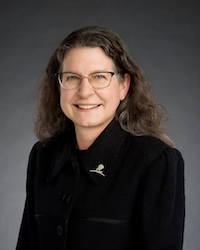
St. Jude Children's Research Hospital
Vice President of Clinical Research Industry Engagement
Dr. Brenda Weigel is Vice President of Clinical Research Industry Engagement at St. Jude Children’s Research Hospital. She was previously the Director of the Division of Pediatric Hematology/Oncology and a professor cross-appointed at the University of Minnesota’s Masonic Cancer Center and the Department of Pediatrics, and held the Lehman/Children's Cancer Research Fund Endowed Chair in Pediatric Cancer. She was the Co-Director of the Sarcoma Program for the Masonic Cancer Center. Dr. Weigel received her medical degree from McMaster University in Hamilton, Ontario, and completed her residency in pediatrics at the University of Western Ontario, followed by her fellowship in Pediatric Hematology/Oncology and Bone Marrow Transplant at the University of Minnesota. Dr. Weigel’s major interests have been advancing new therapies for children with cancer. Her research interests are centered in her extensive involvement with the Children’s Oncology Group (COG). She chaired the Developmental Therapeutics Committee and the National Cancer Institute-funded Pediatric Early Phase Trials Network from 2013-2024. She is also active in COG’s Soft Tissue Sarcoma Committee and led trials in rhabdomyosarcoma.
National Cancer Institute
Special Advisor to the Director for Childhood Cancer
Dr. Brigitte Widemann is a pediatric oncologist with the primary interest of developing effective therapies for children and adults with genetic tumor predisposition syndromes, such as neurofibromatosis type 1 (NF1), and rare solid tumors through innovative clinical trial design. Dr. Widemann currently serves as the head of the Pharmacology & Experimental Therapeutics Section and as Chief of NCI’s Pediatric Oncology Branch. Dr. Widemann is also a medical advisor to a new NCI initiative to Advance RASopathy Therapies (ART) and serves as Special Advisor on Childhood Cancer to the NCI Director.
Anticancer drug discovery and development are moving towards a more rational and targeted approach. The application of new molecularly targeted agents to the treatment of childhood cancers and neurofibromatosis type 1 (NF1) is a research objective of the Pharmacology & Experimental Therapeutics Section (PETS). In addition to studying the pharmacology, pharmacokinetics, pharmacodynamics, and toxicities of these novel agents, it is also a goal of the PETS to evaluate novel clinical trial designs and trial endpoints, which may be more applicable for molecularly targeted agents.
Children’s Hospital of Philadelphia
Associate Chief Scientific Officer for Omics, Technology and Engineering
Dr. Yi Xing is Associate Chief Scientific Officer for Omics, Technology & Engineering at the Children’s Hospital of Philadelphia, where he also serves as Executive Director of the Department of Biomedical and Health Informatics, Founding Director of the Center for Computational and Genomic Medicine, and the Francis West Lewis Chair in Computational and Genomic Medicine. He is also a professor in the Department of Pathology and Laboratory Medicine at the University of Pennsylvania. Dr. Xing is internationally recognized for his research at the interface of computational biology, genomics, and precision medicine, with a focus on transcriptomics, RNA regulation, rare diseases, and cancer immunotherapy. His lab develops innovative computational and experimental technologies to decipher transcriptomic variation and translate RNA-level insights into clinical applications.
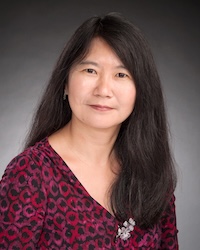
St. Jude Children’s Research Hospital
Endowed Chair of Bioinformatics, Member, Computational Biology Department
Dr. Jinghui Zhang is a computational biologist focused on developing and applying genomic-based approaches for improving the treatment and outcome of pediatric cancer. Her research on innovative computational methods development has greatly advanced biomedical research involving discovery, interpretation and visualization of somatic and germline variants. She has led the mapping of genomic landscapes of >20 subtypes of pediatric cancer, first pan-pediatric cancer study, and discovered therapy-related mutational signatures, non-coding driver variants, and clonal hematopoiesis in patients or long-term survivors of pediatric cancer. She has played a leading role in major studies that have examined the nature of inherited genetic variants which involve characterization of genetic variants in the first sequenced human genome and germline mutations causing cancer susceptibility in pediatric cancer patients and survivors. These findings have led to new clinical protocols, prioritization of clinical trials on identified targets, implementation of whole-genome based oncology testing and have impacted the national strategy/funding/policy development. She has built a new Computational Biology Department at St. Jude by recruiting and mentoring multi-disciplinary computational experts to establish innovative research programs focusing on pediatric cancer. An advocate for genomic data sharing, she initiated the development of St. Jude Cloud, the world’s largest pediatric cancer data sharing platform. Dr. Zhang has published 245 peer-reviewed articles with >170,000 citations (H-index 103) and mentored 11 postdoctoral fellows/staff scientists to faculty positions. She is an elected Fellow of International Society of Computational Biology Class 2023 and an elected of the AACR Academy Class of 2025.